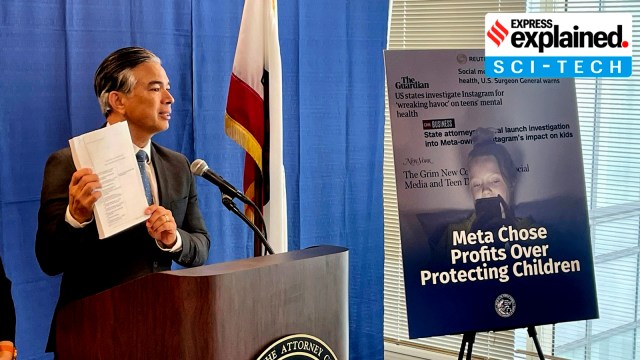Dozens of US states have sued Instagram and Facebook’s parent company Meta, accusing the tech giant of contributing to the youth mental health crisis through the addictive nature of its social media platforms.
In a complaint, the attorneys general of 33 US states, including California and New York, said Meta repeatedly “misled” the public about the dangers of its platforms, and knowingly induced young children and teenagers into addictive and compulsive social media use.

The lawsuit comes two years after former Meta employee Frances Haugen emerged as a whistleblower with allegations that the company was knowingly preying on vulnerable young people to boost profits. She had revealed an internal study at Instagram which found that many young girls using the app were suffering from depression and anxiety around body-image issues.
What has the lawsuit alleged?
While a majority of the lawsuit has been redacted from public view, it specifically names features such as likes, alerts and filters that are “known to promote young users’ body dysmorphia”. Body dysmorphia leads a person to spend a lot of time worrying about flaws in their appearance, and often these perceived flaws are unnoticeable to others.
“Meta has harnessed powerful and unprecedented technologies to entice, engage, and ultimately ensnare youth and teens,” the suit said. “It has concealed the ways in which these platforms exploit and manipulate the most vulnerable consumers: teenagers and children. And it has ignored the sweeping damage these platforms have caused to the mental and physical health of our nation’s youth.”
Meta has contested the allegations. “We share the attorneys general’s commitment to providing teens with safe, positive experiences online, and have already introduced more than 30 tools to support teens and their families,” Liza Crenshaw, Meta spokesperson, said in a statement responding to the lawsuit. “We’re disappointed that instead of working productively with companies across the industry to create clear, age-appropriate standards for the many apps teens use, the attorneys general have chosen this path.”
What had Frances Haugen revealed about Instagram’s impact on mental health?
In the lawsuit, Haugen’s testimony to Congress has been cited. In 2021, she came out with a set of blockbuster internal documents from Meta. One of them was an internal survey which Instagram had carried out to find the app’s impact on teens in the US and UK.
Story continues below this ad
“Thirty-two percent of teen girls said that when they felt bad about their bodies, Instagram made them feel worse,” was one of the findings of the survey. Teenagers also tend to blame their usage of Instagram for increased rates of anxiety and depression, it had found.
Significantly, one presentation showed that 13 percent of British users and six percent of users in the US connected their desire to kill themselves to their usage of Instagram, as per the survey.
How does social media impact mental health?
According to the results of a survey conducted by the Pew Research Center, which were published in April 2021, in the US, the majority of 18-29 year olds said they use Instagram (71 percent) or Snapchat (65 percent). Half of the respondents in this age group said that they use TikTok.
There is plenty of research that has shown that social media use can have an adverse impact on users. According to a study published in the journal Behaviour & Information Technology earlier this year, researchers found that increased passive social media use was linked to elevated levels of anxiety, depression and stress.
Story continues below this ad
“This finding highlights the positive aspects of active non-social media use, such as public content sharing, that allows users to receive feedback, such as likes and positive comments to their posts, but without the demands of direct social interactions. In other words, active non-social media users do not experience the additional pressures from constantly participating or initiating conversations with other people online which can be mentally exhausting,” said Constantina Panourgia, corresponding author of the paper, in a press statement.








































